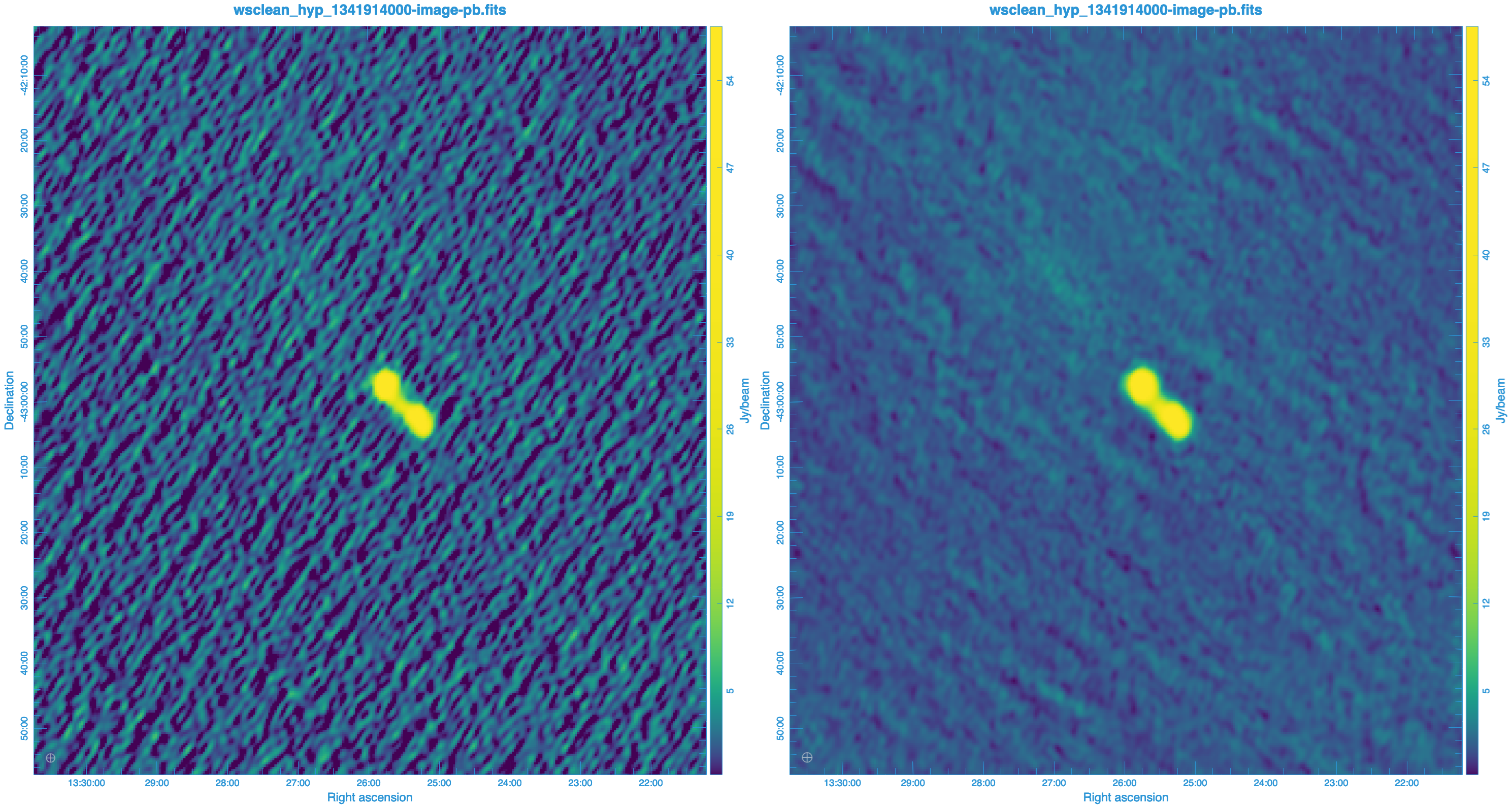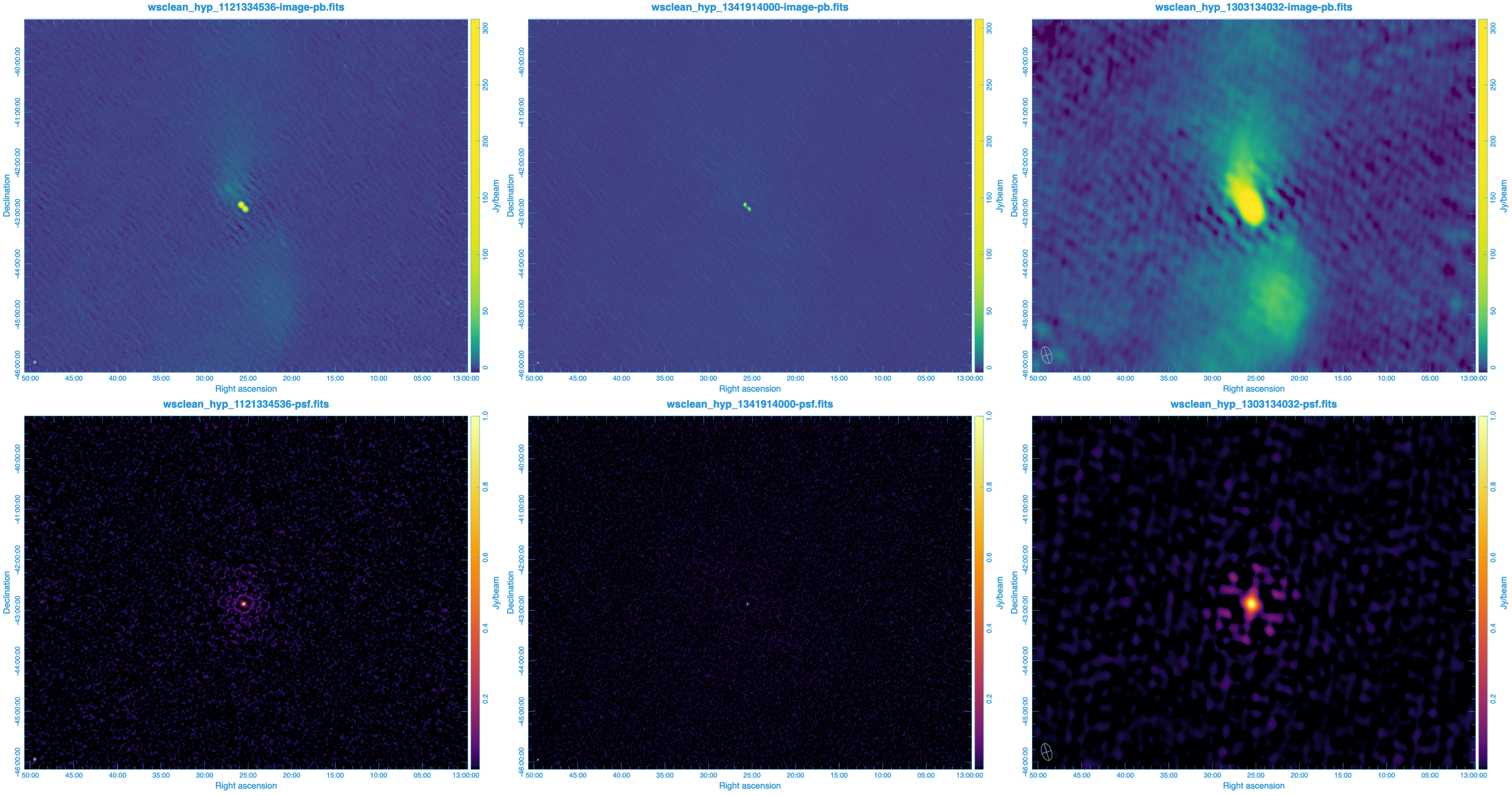Demonstration pipeline for Murchison Widefield Array (MWA) data
flowchart TD;
classDef in fill:#2aa198;
classDef out fill:#d33682;
classDef file fill:#268bd2;
classDef proc fill:#b58900;
classDef decision fill:#cb4b16;
subgraph s01 ["01. TAP"]
mwaTap([fa:fa-search MWA TAP ]); class mwaTap in;
obsids[/"fa:fa-table obsids.csv "/]; class obsids file;
mwaTap --> obsids;
end
subgraph s02 ["02. Download"]
mwaAsvo([fa:fa-download MWA ASVO]); class mwaAsvo in;
giant-squid[[fa:fa-download giant-squid ]]; class giant-squid proc;
raw[/ fa:fa-file raw data /]; class raw file;
metafits[/ fa:fa-file metafits /]; class metafits file;
obsids --> giant-squid --> mwaAsvo --> raw & metafits;
end
subgraph s03 ["03. MWALib"]
mwalib[[fa:fa-wrench MWALib]]; class mwalib proc;
mwalibOut[/fa:fa-table antennas and channels /]; class mwalibOut file;
%% channels[/fa:fa-table channels.csv/]; class channels file;
metafits --> mwalib --> mwalibOut;
end
subgraph s04 ["04. SSINS"]
ssins[[fa:fa-flag SSINS]]; class ssins proc;
flags[/fa:fa-file-image flag plots/]; class flags file;
raw & metafits --> ssins --> flags;
end
s02 -.....->|raw| s05
subgraph s05 ["05. Preprocess"]
birli[[fa:fa-bolt Birli ]]; class birli proc;
prepUVFits[/fa:fa-file preprocessed uvfits /]; class prepUVFits file;
prepQA[[fa:fa-gem prepQA]]; class prepQA proc;
prepQAJson[/fa:fa-file-code prepQA json /]; class prepQAJson file;
%% local copy of metafits and raw to simplify graph
metafits05[/fa:fa-file metafits /]; class metafits05 file;
raw05[/ fa:fa-file raw data /]; class raw05 file;
metafits05 & raw05 --> birli --> prepUVFits;
metafits05 & prepUVFits --> prepQA --> prepQAJson;
end
subgraph s06 ["06. calibrate"]
hypCalSol[[fa:fa-wrench hyperdrive di-cal]]; class hypCalSol proc
calSol[/fa:fa-file-excel cal solutions/]; class calSol file
prepUVFits[/fa:fa-file prep uvfits/]; class prepUVFits file
calQA[[fa:fa-gem calQA]]; class calQA proc;
calQAJson[/"fa:fa-file calqa.json "/]; class calQAJson file
plotSolutions[[fa:fa-gem hyperdrive solutions-plot]]; class plotSolutions proc
plotSol[/"fa:fa-file-image solution plots "/]; class plotSol file
hypApply[[fa:fa-times-circle hyperdrive solutions-apply ]]; class hypApply proc
calMS[/fa:fa-file calibrated CASA Measurement Set /]; class calMS file
%% local copy of metafits to simplify graph
metafits06[/fa:fa-file metafits /]; class metafits06 file;
metafits06 --> hypCalSol
prepUVFits -----> hypCalSol --> calSol
metafits06 & calSol --> calQA --> calQAJson
metafits06 & calSol --> plotSolutions --> plotSol
calQAJson -.->|bad antennas| hypApply
calSol & prepUVFits --> hypApply --> calMS
end
subgraph s07 ["07. image"]
imgDConv[/"fa:fa-file-image wsclean*.fits "/]; class imgDConv file
wscleanDConv[[fa:fa-image wsclean ]]; class wscleanDConv proc
%% imgMetricsJson[/fa:fa-file img_metrics.json /]; class imgMetricsJson file
%% imgQA[[fa:fa-gem imgQA]]; class imgQA proc;
calMS --> wscleanDConv --> imgDConv
%% --> imgQA --> imgMetricsJson
end
This demo runs best on a linux amd64 (x86_64) machine with at least:
- 16GB of RAM
- 20GB free disk space
macOS amd64 (Intel) and arm64 (M-Series) will work, but CPU-only.
Windows users will need to use WSL2 or Docker Desktop with Git Bash.
Clone this repository to a machine that meets the system requirements.
git clone https://github.com/MWATelescope/mwa-demo.git
cd mwa-demoIf you originally cloned this repository days before the workshop, it's a good idea
to check for updates right before the workshop starts with a git pull.
Download demo data (from Pawsey). You should be in the root of the repository.
mkdir -p demo/data/1121334536/raw
curl -L -o demo/data/1121334536/raw/1121334536_20150719094841_gpubox20_00.fits 'https://projects.pawsey.org.au/mwa-demo/1121334536_20150719094841_gpubox20_00.fits'
mkdir -p demo/data/1303134032/raw
curl -L -o demo/data/1303134032/raw/1303134032_20210422134116_gpubox20_01.fits 'https://projects.pawsey.org.au/mwa-demo/1303134032_20210422134116_gpubox20_01.fits'
mkdir -p demo/data/1341914000/raw
curl -L -o demo/data/1341914000/raw/1341914000_20220715095302_ch137_000.fits 'https://projects.pawsey.org.au/mwa-demo/1341914000_20220715095302_ch137_000.fits'Alternatively , you can download the same demo data in your browser here and extract it to the demo/data directory.
unzip -n demo2.zip # -n = do not replace pre-existing filesThere are several ways that you can provide the software dependencies to run this demo:
- docker: run the software in a Docker container (recommended for new users!)
- bare metal: install everything to your local machine (best for performance)
- hybrid: use a mix of Docker and local software (good balance)
- singularity: similar to Docker, but for shared HPC environments
The scripts in this demo are designed to be run from a Bash shell, with all
binaries available in $PATH.
When your software environment is ready, you can test it by running demo/00_test.sh
Some dependencies like casacore simply do not work on Windows, so you will need to use Docker or WSL. The scripts are written for a Bash shell, and won't work in PowerShell or CMD.
The demo has been tested on Windows 11 with Docker Desktop 4.33.1 on a Git Bash shell.
Some Windows users with 8GB of RAM have reported that the demo runs out of memory running Docker withing WSL. It may be necessary to change
A cross-platform, cpu-only Dockerfile is provided which encapsulates all software
dependencies.
For maximum portability, generic Docker images have been built for the linux/amd64 and
linux/arm64 platforms, however neither take full advantage of the hardware acceleration
available on your machine. For maximum performance, you should follow the bare metal
instructions.
Windows and macOS users should install Docker Desktop.
Linux users should Carefully follow these instructions
to install Docker Engine. Debian and Ubuntu users may be tempted to install docker via snap, but
this is not recommended. I personally use the unofficial docker.io package available on apt.
Linux users should also ensure they have permissions to run docker without root:
sudo usermod -aG docker $USER
quick start: pull the images from dockerhub.
docker pull mwatelescope/mwa-demo:latestWhen running the demo, you should run the commands in an interactive Docker shell.
docker run -it --rm -v ${PWD}:${PWD} -w ${PWD} -e MWA_ASVO_API_KEY=$MWA_ASVO_API_KEY mwatelescope/mwa-demo:latestmacOS users: if you see this error: WARNING: The requested image's platform (linux/amd64) does not match the detected host platform (linux/arm64/v8) and no specific platform was requested, you should pull the image for the correct platform.
docker pull --platform linux/arm64 mwatelescope/mwa-demo:latestIf you have any issues, you should delete all traces of the image that was pulled and build the image locally. (this may take a while)
# first remove the image that was pulled from dockerhub
docker rmi mwatelescope/mwa-demo:latest
docker builder prune --all
docker buildx prune --all
docker build -t mwatelescope/mwa-demo:latest -f Dockerfile .For advanced users
For optimal performance, you should compile the following software dependencies directly on your machine.
Advanced users can provide additional compiler flags during the build process to optimize for their specific CPU micro-architecture. e.g. -march=native for C/C++, or -C target-cpu=native for Rust.
The steps in the Dockerfile may be a useful guide.
- python 3.8+ https://www.python.org/downloads/
- pyvo https://pyvo.readthedocs.io/en/latest/#installation
- mwalib https://github.com/MWATelescope/mwalib/wiki/Installation%3A-Python-Users
- ssins https://github.com/mwilensky768/SSINS#installation
- mwa_qa
git clone https://github.com/d3v-null/mwa_qa.git ; pip install .
- jq https://jqlang.github.io/jq/download/
- AOFlagger https://aoflagger.readthedocs.io/en/latest/installation.html
- wsclean https://wsclean.readthedocs.io/en/latest/installation.html
- recommended: EveryBeam https://everybeam.readthedocs.io/en/latest/build-instructions.html
- recommended: IDG https://idg.readthedocs.io/en/latest/build-instructions.html
- rust https://www.rust-lang.org/tools/install
For advanced users
If you have some software dependencies installed locally, you can use Docker to run the rest.
This will create fake binaries in the ./bin directory that just call Docker for any missing commands.
demo/00_hybrid.sh
export PATH=${PATH}:./bin/This is probably bad practice for a production pipeline!
For advanced users
Most HPC environments don't allow you to run Docker (for security reasons). You can however run Docker images in Singularity.
singularity exec -B$PWD -W$PWD --cleanenv docker://mwatelescope/mwa-demo:latest /bin/bashPlease register for an ASVO account: asvo.mwatelescope.org/registration Visibility data is made public 18 months after observation. For any support enquiries, please email asvo_support@mwatelescope.org
Once you have your ASVO account, log in to https://asvo.mwatelescope.org/profile to obtain your API key and set it as an environment variable:
export MWA_ASVO_API_KEY="..."Detailed instructions here: https://mwatelescope.atlassian.net/wiki/spaces/MP/pages/24972779/MWA+ASVO+Command+Line+Clients#Finding-your-API-key
you may want to add this to your ~/.bashrc to persist it
across sessions, but remember to keep this key secret!
The last step before the workshop is to check that everything is working.
demo/00_test.shPlease ensure that:
- scripts are run from the root of the repository (don't
cdinto thedemodirectory). - scripts are not sourced, and are run directly.
- (if Docker) you are in a Docker shell, not your host system.
- (if hybrid), you have run
demo/00_hybrid.shandexport PATH=${PATH}:${PWD}/bin/ - (if singularity), you are in a Singularity shell,
singularity exec -B$PWD -W$PWD --cleanenv docker://mwatelescope/mwa-demo:latest /bin/bash
Once any warnings from the test script have been addressed, you will be ready to do the workshop.
You can stop here if you'd like to follow along with the workshop on the day.
# (optional) pick a specific obsid:
export obsid=1121334536 # Phase I
export obsid=1303134032 # Phase II Compact
export obsid=1341914000 # Phase II Extended, lst=192
# query the MWA TAP server with ADQL using the pyvo library
clear; demo/01_tap.sh
# display giant-squid commands to download observations
clear; demo/02_download.sh
# mwalib read observation metadata
demo/03_mwalib.sh
# SSINS find RFI
demo/04_ssins.sh
# Birli preprocess raw files, quality analysis, write uvfits
demo/05_prep.sh
# hyperdrive direction independent calibrate, qa, apply solutions, write measurement set
demo/06_cal.sh
# wsclean cal_ms
demo/07_img.sh
# doneYou can inspect the images produced in Carta
carta --top_level_folder . --host 127.0.0.1The images for 1341914000 look a bit weird, let's enable calqa flags and try again.
uncomment this line in demo/06_cal.sh to apply bad antennas and see how the image changes!
export cal_bad_ants=""export obsid=1341914000
rm -rf $outdir/$obsid/{cal,img}
demo/07_img.shdid aoflagger really get all the RFI?
export metafits=${outdir}/${obsid}/raw/${obsid}.metafits
export prep_uvfits="${outdir}/${obsid}/prep/birli_${obsid}.uvfits"
export cal_ms="${outdir}/${obsid}/cal/hyp_cal_${obsid}.ms"
python ${SCRIPT_BASE}/04_ssins.py $prep_uvfits
python ${SCRIPT_BASE}/04_ssins.py $cal_msnow let's look at the rest of the obsids
for obsid in 1121334536 1303134032 1341914000; do
demo/07_img.sh || break
donecombine them all into a single image
rm -rf ${outdir}/combined/img/
obsid="combined" cal_ms=$(ls -1d ${outdir}/13*/cal/hyp_cal_*.ms ) demo/07_img.shclean up outdir to start fresh
demo/99_cleanup.shFor advanced users
You may wish to customize some of the other parameters in demo/00_env.sh, e.g.:
$outdirthe output directory, where files are written. If you're extending this demo with more observations, you may want to put the files in a directory with more space.$srclistthe calibration sourcelist. Fits catalogue support (not fully tested) is available in this branch$MWA_BEAM_FILEthe beam model
See also: Extending The Demo for additional instructions for customizing the docker images.
For advanced users
If you extend the Dockerfile, you may want to publish your modified image for
multiple platforms using docker buildx.
# quick start: pull the images from dockerhub.
docker pull mwatelescope/mwa-demo:latest # on macos or linux arm64 (Apple M series), add --platform linux/arm64
# if you have any issues, you can override the image with a fresh build on your local machine
# docker rmi mwatelescope/mwa-demo:latest
docker build -t mwatelescope/mwa-demo:latest -f Dockerfile .
# If you still encounter issues on macOS arm64 (Apple Silicon, M series),
# the same image is also available via Docker x86_64 emulation. Make sure to update
# your Docker Desktop to the latest version, as this features is relatively new.
docker pull --platform linux/amd64 mwatelescope/mwa-demo:latestHere's how to customize and build the image for multiple platforms and push to dockerhub
# (optional) get your docker username
docker login
export DOCKER_USER=$(docker info | sed '/Username:/!d;s/.* //');
if [ -z $DOCKER_USER ]; then
export DOCKER_CREDSTORE=docker-credential-$(jq -r .credsStore ~/.docker/config.json);
export DOCKER_USER=$( $DOCKER_CREDSTORE list | jq -r ' . | to_entries[] | select( .key | contains("docker.io") ) | last(.value)' )
fi
# create a new builder instance if not already created
docker buildx create --driver=docker-container --name=multi --use
# build the image for multiple platforms.
# - (optional) use build args to specify software versions.
# - use --push instead to push to dockerhub
# - or use --load to load the image into the local docker daemon
export EVERYBEAM_BRANCH="v0.5.2"
export IDG_BRANCH="v1.2.0"
export WSCLEAN_BRANCH="v3.4"
export tag=${DOCKER_USER}/mwa-demo:everybeam${EVERYBEAM_BRANCH}-idg${IDG_BRANCH}-wsclean${WSCLEAN_BRANCH}
docker buildx build \
-f Dockerfile \
--platform linux/amd64,linux/arm64 \
--build-arg="EVERYBEAM_BRANCH=${EVERYBEAM_BRANCH}" \
--build-arg="IDG_BRANCH=${IDG_BRANCH}" \
--build-arg="WSCLEAN_BRANCH=${WSCLEAN_BRANCH}" \
-t $tag \
--push \
.
# DEV: docker buildx build --platform linux/amd64,linux/arm64 -t mwatelescope/mwa-demo:latest -f Dockerfile --push .If you add extra raw files, you can add their checksums with
md5sum demo/data/*/raw/1*fits | tee demo_data.md5sum
